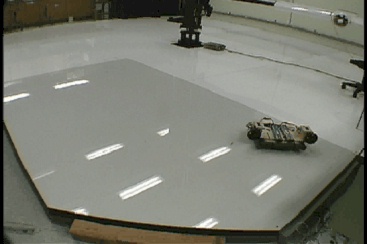Information Flow in Cooperative Control of Multi-Vehicle Systems
|
|
|
California Institute of Technology
|
Project Information
This project is focused on developing the underlying theory required to achieve
integration of information flow into control analysis and design for cooperative
tasks of multi-vehicle systems. By making use of tools from control theory,
dynamical systems, and graph theory, we are developing a framework for analyzing
the effects of information and sensor topology on feedback systems and developing
tools for designing information flow and control algorithms that build on this
framework. We are applying these ideas to several test problems involving real-time,
distributed control of a set of multiple vehicles performing cooperative tasks.
In addition to computational exploration through simulation, we plan to implement
our algorithms on a multi-vehicle, wireless testbed for networked control, communications,
and computing that is being developed at Caltech.
Related Projects:
Team
- Richard Murray (PI), Professor of Mechanical Engineering, Caltech
- Lars Cremean, Mechanical Engineering, Caltech
- Abhishek Tiwari, Electrical Engineering, Caltech
- Vijay Gupta, Electrical Engineering, Caltech
- Kristi Morgansen, Control and Dynamical Systems, Caltech
Departed
- J. Alex Fax, Control and Dynamical Systems, Caltech
Publications
- 02j/jm02-acc
- Stability
analysis and double-graph model of vehicle formations
Zhipu Jin and Richard M. Murray
Submitted, 2003 American Control Conference
- 02i/gmh02-acc
- On
the Control of Jump Linear Markov Systems with Markov State Estimation
Vijay Gupta, Richard M. Murray, Babak Hassibi
Submitted, 2003 American Control Conference
- 02b/cre+02-cdc
- The
Caltech Multi-Vehicle Wireless Testbed
Lars Cremean, William Dunbar, David van Gogh, Jason Hickey, Eric Klavins,
Jason Meltzer, Richard M. Murray
2002 Conference on Decision and Control (CDC)
-
- 02/fax02-phd
- Optimal
and Cooperative Control of Vehicle Formations
J. Alexander Fax
PhD Dissertation, California Institute of Technology, 2002
- 01k/fm02b-ifac
- Information Flow and Cooperative
Control of Vehicle Formations
J. Alexander Fax and Richard M. Murray
To appear, 2002 IFAC World Congress
- 01g/fm01-cds
- Graph Laplacians and Stabilization
of Vehicle Formations
J. Alexander Fax and Richard M. Murray
CDS Technical Report 01-007. To appear, 2002 IFAC World Congress
Additional Information
- Project proposal (Jan 01)
- Annual reports: Jun 01, Jul
02
- Presentations: Aug 02, Mar 03
- Movies:
 |
 |
 |
|
(a) No information flow
|
(b) Flow loop shaping
|
(c) With feedforward
|
| This sequence of movies show some of the uses of information
flow for stabilization a hexagon formation of vehicles. |
 |
 |
 |
|
(a) Manual control [17M]
|
(b) Formation control [42M]
|
(c) High speed flying [23M]
|
|
|





